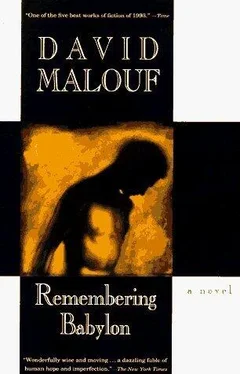In one corner of their room is a heap of keys of every shape and size, some as long as his forearm. Willett adds to them each week by poking about in the boxes outside rag-and-bone shops, or in the market barrows along the canal, weighing this one or that in his palm, turning it in the air and chuckling. He has never been introduced to the rooms, or chests or little boxes the keys unlock. They are part of a life, he believes, that Willett keeps secret from him. He can only think that while he is asleep at night Willett must slip off to one or other of those rooms and sit gloating over the contents of the chests or boxes that lie open before him, but what they might contain he cannot imagine: things that exist in parts of the world he has not seen, that Willett has not revealed to him.
He pinches himself to stay awake. He will follow Willett and see where he goes. But he is too tired. The moment his head touches the sacks he sleeps on he is asleep. He imagines that he has stolen one of the keys, found the room it opens, then a box, and with the lid of the box closed over him, lies with his hands folded in the dark, not daring to breathe, waiting for Willett to appear. He hears the door of the room open. Hears Willett’s boots dragging. Sees a crack of light as the lid is lifted, smells the sweet garden smell, squeezes his eyes shut in the dark, waits for the voice: ‘Ah, boy, so that’s where you’ve got to.’ Waits and waits. In one of the drawers of the chest, in the clean little box of a room at Mrs Hutchence’s with his hands folded on his breast, his cheeks wet with tears, barely breathing.
Six days a week, rain or shine, they go to the park, Regent’s Park. Willett’s job is to clear its ponds of rats. His job is to go in with the ferrets, then, at the end of the day, to see that the animals are caged and watered, to dry Willett’s boots, polish the brass on Ketch’s lead, and, when all is done, to slip out in the early light of the gas-lamps and fetch ale for their supper.
Among so many barefoot urchins slipping in and out of the crowd — up to no good, on the lookout for mischief — he has a place, he is Someone’s Boy. The jug he carries is the guarantee of that; empty on one leg of the journey, so that he can skip along as he pleases, full and in danger of slopping on the way back.
Very happy, since he is of a cheerful disposition, to be free for a little among the noise and many interests of the streets, he ducks and dodges among the crowd, leaping out of the way of carriage wheels on the slushy cobbles and cursing the drivers; when it freezes keeping an eye on the rumps of the standing horses, or the donkeys in costers’ carts, for the wink of an arsehole and the load of steaming shit that comes tumbling; then diving in quick to get the good of it, the lovely quick-fading warmth between his toes. He may stop a moment, not long — Willett can be a devil — to see the blood from an accident, or two punks, urged on by a mob, beating the daylights out of each other, or a tinker at work with a little tink-tink hammer and a bit of fire in a tin, or to trade insults with his friend the hot-muffin man, or catch snatches of music outside a penny-gaff.
As a sideline to the rat-catching trade, Willett supplies rats for weekend matches. As Willett’s Boy he gets pennies for drawing the rats out of their cage, which is a basket with an iron top, and tossing them by handfuls into the ring.
He is used to rats, but it is a mucky business. Willett, very dandified in a red handkerchief and brushed hat, rubs him beforehand with caraway oil, and pets and cajoles, and urges him not to look feared, and if he draws back (out of sight of the gentlemen, of course) whispers hoarse threats, which he knows he can rely on, and pinches him hard under the ribs. But he is afraid.
When he plunges his arm into the musky dark and hauls the sewer- and ditch-rats out of the hot, drain-smelling interior, they squeal and tumble over one another’s backs, and fight, using their teeth something horrible, and he gets many wounds that turn to open sores. He has scars all over his hands — one thumb is bitten through — and on his ears as well, since the rats, if they get the chance, will run up his body like squirrels up a tree trunk and fix their claws in his hair, till Willett untangles and tears them off. They get up the legs of his trousers too if they are not laced at the knees with string.
He is a game little fellow — that is his reputation. He is proud of it, and has learned to swagger and win cheers. Only at night, when he curls up on his pile of sacks, the rats appear in great numbers and huge size in his dreams, and if he yells and wakes Willett he is thrashed. So he sleeps with one of the ferrets under his shirt, in the belief that the smell of it will keep the dream rats off.
That is his life. He can imagine no other. He fusses, in his anxious, old-mannish way, over Willett’s needs, takes pride in their housekeeping and their catch, and pleasure in what bits and pieces of entertainment he comes by in the streets. Willett is an easy fellow when he isn’t drunk or in one of his dumps. They have rare times together. Especially when Mag is with them, who is Willett’s moll, and sometimes, on Willett’s suggestion, when they’ve all been drinking together, takes him on her lap like an overgrown baby, and gives him her breast to suck, and, to Willett’s vast amusement, frigs him under his shirt till he is squealing. But one night, after a beating no worse than others he has received, he waits till Willett is snoring, and, still heavy-headed from the beer they have drunk, gets up, lets the ferrets out of their cages, sweeps a heap of rubbish into the middle of the room, finds tinder, and lights it. There, he thinks as he watches it catch. He could not say what he has in mind. Nothing, perhaps. He is eleven or twelve years old and some darker nature has begun to emerge in him. He has resentments.
He stands watching the smoke make wavery threads. They twine and thicken. When the first little jigging flames appear, a smile comes to his lips. Now a lively redness is playing on the walls, the flames jump in play, so cheerful and full of change that he is held in a state between dreamy contemplation and an excitement that makes the hairs rise all over his body. He breaks off and goes, in an easy unthinking way, to where Willett lies and kicks him. Perhaps he intends to show Willett how changed everything is, to share with him what he has achieved. Willett growls. He does not stir.
The ferrets are running now, tumbling over the backs of chairs, leaping at the walls, the redness bristling on their backs. He too begins to be alarmed. The flames are taller than he is. He runs at them and stamps a little but burns the soles of his feet. Snatching up a rug, he tries to stifle them, but they shoot out from under it, and the rug too catches, showering sparks. He has to throw it in with the rest. The whole room is aglow. It sweats. Grease runs down the walls. The ferrets are mad things under his feet. At last, with smoke thickening all round him and choking in his throat, he can think of nothing else to do but throw the window open, and, as the cold air rushes over his shoulders and the room gives a roar behind him, leap out into the night, and run, and keep running till he passes the last street he recognises and where anyone might recognise him.
It does not occur to him that he has stepped off the world. The streets he is moving through are cobbled, have corners to turn. Walking briskly though aimlessly, since he is in a place he has never been, and avoiding strangers, he comes at last to a deserted part of town, tall buildings with bricked-up windows and what he takes to be the rigging of ships. With his brain roaring, he sits for a time with his hands over his ears and his feet in the gutter, all the inside of his head a blaze of red; then crawls into a doorway to sleep.
Читать дальше












